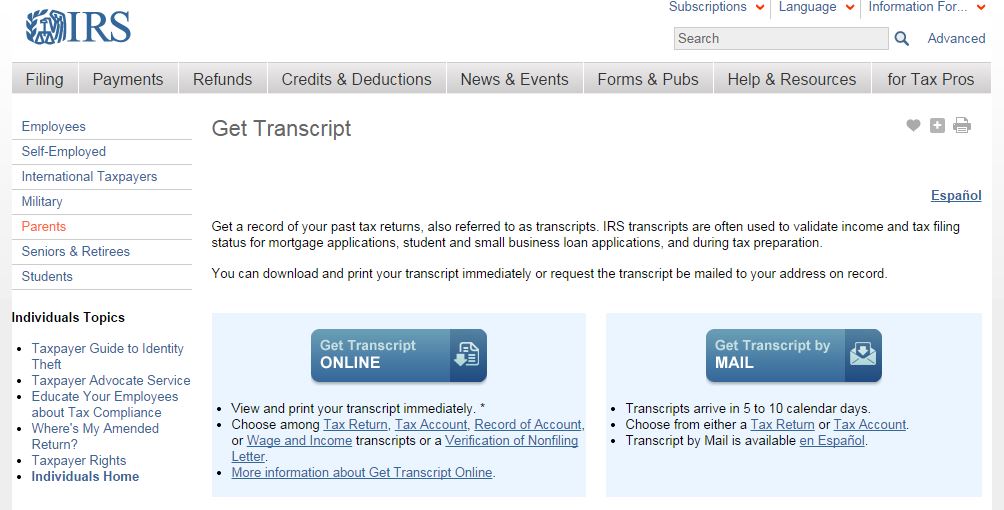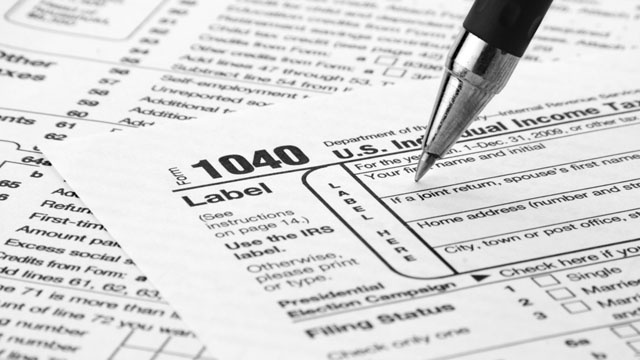
by Optima Financial Group | Sep 3, 2020 | Taxes & Your Savings
Getting a copy of your IRS transcript is easy and can be done entirely via the IRS.gov website. Follow these simple steps to retrieve your tax transcript.
Keep in mind that only transcripts for filed taxes are available. For example, if you did not file in 2003, there won’t be a tax transcript for that year. Also, if the IRS has not finished with your taxes, the transcript will not be available until they have completed those taxes.
What is an IRS Transcript used for?
IRS transcripts are typically used to validate past income and to prove income to lenders. They are often used to determine status for mortgage, student, and small business loan applications and help with tax preparation.
What information is on an IRS Transcript?
An IRS transcript includes most line items from your tax return, including all accompanying forms and schedules, as it was originally filed. Any changes made after the original filing will not be reflected. Key information listed on transcripts include marital status, AGI, taxable income, payment methods, and W-2 information.
How to get your IRS Transcript Online
You can request tax transcripts online for the current tax year and the three prior tax years. To request older transcripts, you’ll need to submit Form 4506-T. To request a transcript online:
- Visit the IRS website at IRS.gov.
- Look under the Tools tab that is part way down the web page. Click: Get transcript for your tax records.
- Once you reach the transcript page, you can request to get them by mail or continue getting them online by clicking on the box to the left, Get transcript online.
- If you have gotten transcripts before, you can sign in. If not, you will need to click on the right side to create an account: Sign up.
- Complete the sign up process and log in.
- The next page will show a drop-down menu and ask why you need the transcript. Choose the answer that best fits your needs and continue. They ask you what you need it for so they can help you pick the right transcript.
- The next page lists all your transcripts, in four different categories for all the years you filed. These include Tax Return Transcript, Record of Account Transcript, Account Transcript, and Wage and Income Transcript.
- Select the transcript you need for the right year.
- The site will automatically generate a PDF file of your transcript. Print it and save it.
- Log out completely or close the browser when you are finished.
Make sure your pop-up blocker is off for the IRS site. It can cause errors when trying to retrieve your transcripts. If you chose mail, allow 5 to 10 business days for them to arrive before requesting another.
If you have problems navigating the website, you can contact the IRS for further assistance at 1-800-829-1040. For further assistance or help with a different tax issue, contact Optima Tax Relief. Optima Tax Relief offers a comprehensive range of tax relief services. Schedule a consultation with one of our professionals today.

by Optima Financial Group | Feb 11, 2020 | Tax Planning
Do I Need to File a Federal Tax Return?
More than 43% of Americans don’t have to file a federal tax return. Are you one of them?
While the IRS expects to receive more than 150 million tax returns this year, it is estimated that nearly 43% of Americans don’t have to file a federal tax return according to the IRS.
So how are millions of Americans avoiding this tedious task? Is there minimum income to file taxes?
Do I Need to Pay Federal Income Taxes?
The recent recession had a lot to do with the fact that nearly half the country is off the hook when it comes to filing a tax return. Many people faced a drastic reduction in their earned income, and now simply do not make enough money to meet the minimum requirements to file. Additionally, President Obama teamed up with Congress to boost existing credits and create new stimulus measures which have resulted in many people qualifying for tax benefits and credits which eliminate their tax obligation entirely.
What is the Minimum Income to File Taxes?
There is a minimum income to file taxes. If you are age 64 or younger, filing as single and earned more than $10,000.00 in 2013 ($11,500.00 if age 65 or older), then you are among those who have to file a tax return with the IRS this year. If you were married at the end of 2013 and you plan on filing separate returns, you must file if you earned more than $3,900.00 in 2013.
* Is there a minimum income to file taxes for children?
These days there are more and more children working each year, oftentimes earning enough throughout the year to require that they file a return as well. This can be a complicated matter when trying to decide if the child should file a return and how that could affect their parents claiming them as dependents on their own return. Basically, a child must file a tax return if their earned income was over $6,100, however parents are still able to claim these children as dependents on their tax return if the child lived with them.
Even if you’re not required to file…
One important thing to consider is even if you are not required to file a federal tax return for 2013, you may want to still file a return as it may result in a refund owed to you. If you had income tax withheld from your paycheck or if you qualify for the EITC, additional child tax credit, health coverage tax credit, or refundable American opportunity education credit, filing a return will most likely result in the IRS sending you a refund check.
The Earned Income Tax Credit
A major tax credit that helps Americans reduce their tax liability is the Earned Income Tax Credit (EITC). The EITC was originally approved by Congress in 1975 to help working Americans (with a low to moderate income level) keep more of what they earned. According to the TPC, about one in five tax returns (close to 28 million) that were filed in 2010 claimed the EITC, resulting in over 60 million dollars in credit to Americans. For the 2013 tax year, working families with children that have annual incomes below $37,870 to $51,567 (depending on number of children) will be eligible for the federal EITC, as well as those without children that have incomes below $14,340.
According to the IRS, about three out of four people who file a tax return this year will receive a refund. Last year taxpayers received an average refund of $2,744, and the IRS is typically able to process that refund within 3 weeks. You can get your refund from the IRS quickest by e-filing your tax return and opting to direct deposit your refund into your bank account.
Filing your annual income tax return can be a complicated and tedious task, but there are many benefits and credits available now to help reduce or even eliminate your tax liability. Even if you are not required to file a return, these tax credits can result in an unexpected refund from Uncle Sam. However, you have to file the return to receive the cash, so be sure to explore all of the available credits and deductions when preparing your return this year.
Need some help filing taxes? Optima Tax Relief offers tax consultation.

